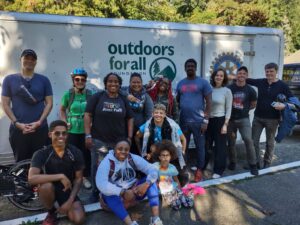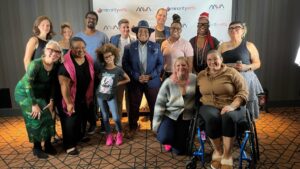Renee Bellis, Feedback Labs | September 19th, 2024
This year, we’re investing in hearing from members of our community about their high-quality, equitable listening practices! One way that we’re doing that is by conducting interviews with past participants of the Feedback Crash Course to learn how the feedback loop has been implemented at their organizations and to hear about the impact of feedback on their work. Lindsay Church is the Co-Founder and Executive Director of Minority Veterans of America (MVA), a 2022 Feedback Champion, and Crash Course participant.
The Big Picture
 When we had a chance to connect earlier this year, Lindsay told us about the transformational impact that feedback has had at MVA. While the organization already prioritized listening to its constituents, the feedback loop gave them a structure to capture stories and needs and adapt programs to improve accessibility and participant experience. Lindsay described a shift in the organizational culture to include feedback. As a result, the whole team thinks about and embeds feedback in their work. Positive feedback has become an organizational performance measure and MVA is systematically working on improving its feedback processes and performance.
When we had a chance to connect earlier this year, Lindsay told us about the transformational impact that feedback has had at MVA. While the organization already prioritized listening to its constituents, the feedback loop gave them a structure to capture stories and needs and adapt programs to improve accessibility and participant experience. Lindsay described a shift in the organizational culture to include feedback. As a result, the whole team thinks about and embeds feedback in their work. Positive feedback has become an organizational performance measure and MVA is systematically working on improving its feedback processes and performance.
This focus on feedback has caused Lindsay to recognize the pivotal role that MVA plays in the feedback loops of large federal agencies like the Department of Veterans Affairs (VA). As a community organization, MVA acts as a trusted agent, or “feedback intermediary,” as Lindsay calls it, communicating feedback from the minority veteran community to the agencies charged with serving them. For example, MVA has used its role as a trusted intermediary to advocate for the disaggregation of feedback data collected by the VA, to better understand how veterans with different identities experience VA’s programs, services, and care.
Let’s take a look at one specific example of a feedback loop at Minority Vets.
About Minority Veterans of America
Minority Veterans of America is an intersectional movement of minority veterans that works on issues of race, gender, sexual orientation, and religion within the veteran community. The organization offers veteran members and their families programs to meet their immediate needs, such as direct financial support, case management, support groups, leadership development, and outdoor recreation programs, while advocating on behalf of the minority veteran community in areas of reproductive and trans rights, racial equity, and diversity and inclusion in government agencies.
Feedback for the Winter Wish Project
When we connected earlier this year, Lindsay spoke about the feedback loop used in the Winter Wish Project. Started in 2020, Winter Wish provides direct support to veterans and their families in the month of December. Participants create an Amazon wish list within a set budget and MVA purchases and ships everything on the list to participants. Lindsay shared that “the Winter Wish Project is one of the coolest programs because, if you do it right, there is so much gratitude, so much joy, so much opportunity to serve deeply in a moment that people are really struggling.” After attending the Crash Course, Lindsay gathered feedback from staff and participants through conversations and surveys to improve the Winter Wish Project.
Collecting and Analyzing Data
MVA uses Monday.com as the platform to run the Winter Wish Project, which allows staff to send automated emails when an application is filled out. Staff configured the system to email out the feedback survey at critical moments such as when a decision has been made on a participant’s application or immediately after their items had been purchased, increasing the completion rate.
The feedback surveys sent to participants asked questions like:
- What did you like about the program? What could we do better?
- What was the easiest part of this application? What was the hardest or most challenging part of the application? These questions determined where applicants were struggling with the application process so changes could be made.
- On a scale of 0 (never) to 10 (absolutely), would you recommend the program to a friend or colleague? This question captured the Net Promoter Score, which allowed MVA to benchmark their results year over year.
In addition, participants were asked open-ended questions about how the program helped them. These questions collected stories about the program and the impact that these resources had on people’s lives, enabling MVA to close the loop with their funders and make the case for future funding. At the end of the feedback survey, on a separate page, Minority Vets collects optional demographic data, which allows the organization to disaggregate feedback data to determine if specific populations are experiencing their programs differently. Before posing questions, the survey explained why MVA was asking for this data–not to track individuals, but to understand trends and improve participant experiences.
Course Correcting in Response to Feedback
Survey results revealed there were too many steps to participate in Winter Wish. They heard feedback that Amazon Wish Lists and veteran verification being asked for from participants after acceptance into the program made it challenging to complete the process from start to finish. So, MVA adapted the application to collect all necessary information upfront. This minor change in the application helped both participants and staff: participants no longer had to remember to do additional steps and staff saved significant time in tracking participants down for this additional information. Streamlining the application process had wider effects on the efficiency of the Winter Wish Project. By collecting applicants’ Amazon wish lists ahead of acceptance to the program, staff could begin buying the items on participants’ lists the day after they were notified that they were accepted to the program. During the hectic month of December, this increased efficiency and allowed staff to get the items to participants more quickly and built in extra time to deal with any issues with shipping that may come up.
Lindsay described four outcomes that were the result of gathering feedback and making changes to the Winter Wish Project:
- After making changes to the program, feedback surveys showed that the Winter Wish Project had a Net Promoter Score of 100, an impressive feat, which meant that everyone who participated in the program would recommend it to a friend or colleague.
- MVA was able to capture many stories of gratitude through the feedback survey. Those stories were shared with funders to highlight the deep and direct impact that funders had by supporting the program. The feedback from program recipients also allowed the organization to close the feedback loop with funders and show staff and volunteers the importance of their work.
- Grant writing became easier because it allows Lindsay to provide numbers for the primarily qualitative data that the organization collects.
- The program became more accessible due to feedback. The changes in the application process meant less participant drop off between the application and delivery of gifts and items.
Winter Wish is one of many programs that have been adapted in response to constituent feedback. Lindsay also described changes to the organization’s Emerging Leaders Program and their annual Equity, Inclusion, and Justice Summit in response to feedback, such as shifting to a virtual format with live captioning to strengthen accessibility and offering hybrid participation options to create greater access. At the end of our conversation, Lindsay shared that “feedback is a gift,” that has improved MVA’s programs and enabled them to act as a feedback intermediary to advocate for better policies at agencies charged with supporting their community such as VA and the Department of Defense.

Lindsay Church (they/them) is the Executive Director and Co-Founder of Minority Veterans of America (MVA), a non-partisan, nonprofit organization committed to creating an equitable and just world for minority veterans, including those from racial, ethnic, gender, sexual, and religious minorities. With over a decade of experience in military and veteran advocacy and grassroots organizing, Church has played a pivotal role in driving transformational policy changes and reforms through coalition efforts. They have facilitated cultural competency trainings and assessments for various organizations and entities, and they consistently provide Congressional testimony on
issues impacting the lives of minority and underrepresented veterans.
A Navy veteran and queer nonbinary individual, Church’s personal experiences navigating the military as an LGBTQ+ person have profoundly shaped their advocacy work. They hold a graduate degree focused on international relations and countering violent extremism, and an undergraduate degree in Near Eastern Language and Civilization and Comparative Islamic Studies, both from the University of Washington. They also hold an Associate’s degree in Persian-Farsi from the Defense Language Institute and served as a Cryptologic Technician Interpretative in the Navy.
Church currently serves on the Task Force on Outdoor Recreation for Veterans, providing recommendations to increase access to outdoor recreation for service members, veterans, and their families. Prior to founding MVA, they were the Assistant Director and co-founder of Student Veteran Life at the University of Washington. Their previous roles include LGBTQ Commissioner for the City of Seattle, Co-Chair of Congresswoman Suzan DelBene’s Veterans Advisory Council, steering committee member for the Recreate Responsibly Coalition, and Co-Chair of the Military Advisory Council for OutServe-SLDN (now Modern Military Association of America).








